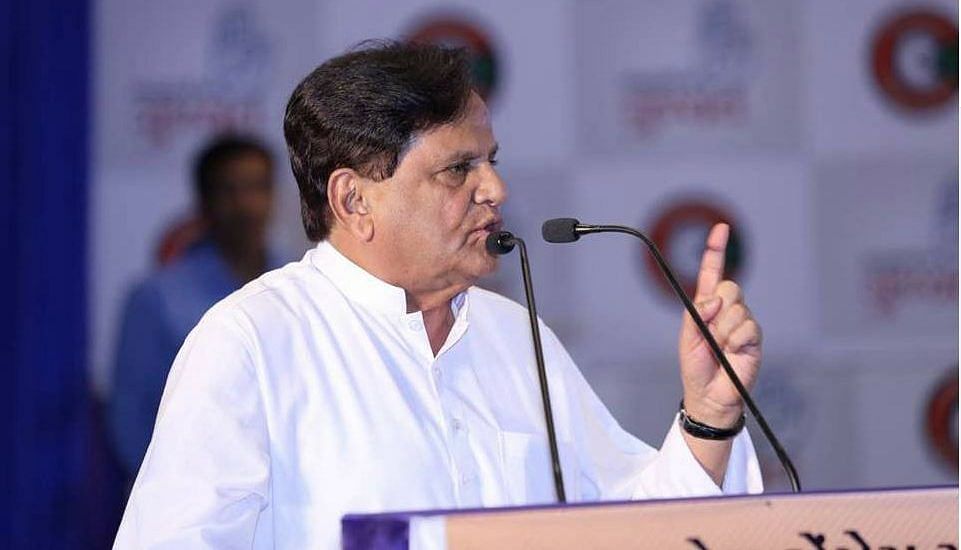Patel, known to be resilient and a leader with friendships across the board, will have to fight Congress’ image problems.
New Delhi: At a cricket match on a winter afternoon in the early 1980s, two young Congress MPs were at the crease.
One of them, Ahmed Patel from Gujarat, had completed his half-century and was racing towards a century when his partner, Madhavrao Scindia, came up to him and said, “You have done enough. I will take over from here.”
The MP from Gujarat got the hint. He was soon out, hit wicket, short of his century.
The spirit of accommodation, self-effacement and deference has held Ahmed Patel in good stead; he has risen to great heights in his political career since.
Also read: After 18 years, Ahmed Patel is back as treasurer of cash-starved Congress
Patel went on to become political secretary to the Congress President Sonia Gandhi and was virtually No. 2 in the party until Rahul Gandhi took over the reins.
In an acknowledgement of his long service to the party and his friendships across the divide — be it politics, the bureaucracy, the social sector or the corporate world — Rahul Gandhi appointed Patel the party’s treasurer on Tuesday.
This has come at a time when the principal opposition party is starved of funds, barely six months before the next general elections.
But for all his resilience, securing donations for the Congress is going to be a very tough job for Ahmed Patel.
Here are three reasons why donors may elude the grand old party.
Party still to inspire confidence
Everyone bets on a winning horse. The Congress does not seem to inspire voters’ confidence even now.
Recent surveys may have shown the NDA government’s popularity ratings declining but Prime Minister Narendra Modi remains the most popular leader in the country. The same surveys have projected the Congress as gaining some ground but the party is still not seen as a veritable challenger.
Corporate and individual donors are known to contribute more to the ruling party, as is evident in the income details that the BJP and the Congress have declared to the Election Commission.
A recent report by the Association for Democratic Reforms (ADR) and the National Election Watch on donations above Rs 20,000 (for which the contributors’ names have to be declared), shows a huge divide in the donor preferences for the BJP and the Congress.
In 2016-17, as per the data, the BJP received Rs 532 crore from 1,194 corporate and individual donors, while the Congress received Rs 42 crore from 599 donors. Compared to 2015-16, there was a 593 per cent increase in such donations to the BJP as against 105 per cent to the Congress.
Even from unknown sources of funding, the BJP has fared way better than the Congress. In 2016-17, the ruling party received Rs 464 crore in such funds, as against the Rs 126 crore by the Congress.
Electoral bonds conundrum
The newly introduced electoral bonds have made it difficult for opposition parties to get corporate donations. While introducing it, the government claimed that it would improve transparency in donations. As it appears, it works favourably for just the ruling party.
These bonds, to be bought by donors from the State Bank of India, don’t have the buyers’ names on them. Donors can deposit the bonds in a party’s designated bank account.
Technically, the entire process is supposed to be anonymous with nobody knowing who donated to which party. In reality though, the government of the day — through the SBI — may have the entire information about the donors and the parties they contribute to. The corporate or individual donors would be conscious of the fact that the government would find out if they donate to an opposition party.
Chief’s anti-industry image
Rahul Gandhi’s anti-industry image may also hurt the Congress’ chance of attracting corporate donors. Though the Congress president has had a few customary interactions with India Inc, his entire politics seems to hinge on the purported rich-versus-the poor or the industrialists-versus- farmers wedge.
Also read: Congress won’t leave any stone unturned to ensure opposition unity, says Ahmed Patel
Gandhi had first earned the anti-industry tag by stalling Vedanta’s bauxite mining project at the Niyamgiri Hills in Odisha. This image has stuck, thanks also to his continuing rhetoric on how a few industrialists are being favoured by the Modi government at the cost of the poor and the farmers.
India Inc may not exactly be ecstatic about the NDA government any more but it remains more apprehensive about the economic philosophy of the principal opposition party.
